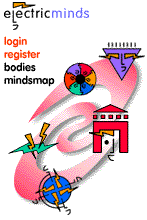
|

|
 Being Here Being Here
"Hey, get your elbows off the table!" My mom said that so much, it should have been a macro. It always seemed arbitrary to me. Why should tables and elbows never meet? I can't tell you. My mom can't tell you. But it's a rule, hard and fast etiquette. "Hey, don't post on line in all capital letters!" Why? People say it's like shouting. But really, why?
Yet over time, the no caps rule has become a tenet of online life. If you post or send mail quick and dirty, caps lock on, sooner rather than later someone will tell you to stop yelling. Being Here is devoted to tracking the trends and wisdom of online etiquette, featuring talk about personal experience with the norms, arbitrary or reasonable, of communication on the net and critical looks at the collected wisdom of prescriptivists. First, what are experts of online behavior telling us about the hard and fast rules of netiquette? Do an AltaVista search on "netiquette", you get nearly 39,000 matches. No kidding. There's a whole lot out there on the net. A whole lot of people tell us not to put our elbows on the table. What's useful? Here's what's useful. The Netiquette Home Page, Arlene Rinaldi Arlene Rinaldi, Internet Resources Coordinator/Webmaster at Florida Atlantic University, based the "The Net: User Guidelines and Netiquette" on her extensive professional and personal Internet use. Translated into ten languages, "The Net: User Guidelines and Netiquette" is cited and linked to repeatedly in netiquette discussions, making Rinaldi the leading online netiquette authority. Drawing on her own experience, Rinaldi discusses standards for e-mail, newsgroups, ftp, telnet, the World Wide Web. Well-organized, incredibly specific and comprehensive, "The Net: User Guidelines and Netiquette" is the one best guide to how to be on line. This site feels initially a bit terse, as it lists information in bullet points and skips narration for the most part. However its links, which use discussions from NETTRAIN, a mailing list for Internet trainers that covers online propriety, are much richer and more fully imbued with Rinaldi's personality and obvious passion for the study of norms of online life. The exhaustive coverage of the finest possible social implication of nearly any form of online communication and the sheer depth of Rinaldi's explanations go far toward making the conventions of the net clearer. There's very little "because I said so" here, and that quality makes Rinaldi's "The Net: User Guidelines and Netiquette" the best resource out there. Netiquette, Virginia Shea Published as a hard-copy book in 1994, Netiquette is now available on line. Its formatting chops up the text into surprisingly small pieces and it is not particularly well organized for online access. That ironic inconvenience aside, Netiquette effectively outlines the basics of proper online living circa 1994 and strongly advocates the establishment and acceptance of standard for online behavior. As Howard Rheingold noted in a review of Netiquette, Shea shows us where the double yellow lines on the information superhighway ought to be. It's crucial to note its publication date; it's said that a month on the 'net is like a year of real time, and the phenomenon of the World Wide Web isn't a part of Netiquette's world. Nevertheless, Shea delves into electronic privacy and copyright issues and suggests ten concise Core Rules of Netiquette. But as a guide to proper e-mail and newgroup usage, Netiquette is still quite relevant. Dear Emily Postnews, Brad Templeton Take what Emily Postnews says and do the opposite. The sarcasm of "Dear Emily Postnews" simultaneously lightens the often pedantic literature of netiquette and manages to give sound, if backhanded advice. In the persona of Emily Postnews, Templeton answers twenty-six questions about how to post on line, specifically in newsgroups, with the worst possible advice. Yeah, he's a wise guy. But he also has a keen eye for often-asked questions and many people may prefer his far drier style. A final note: like Shea's Netiquette, "Dear Emily Postnews" reflects the realities of a pre-World Wide Web Internet. |
jfxo said: Being relatively new to any online community, I must admit that there is a tendency for relationships to develop at a greatly accelerated pace in the online world. I think this phenomenon has a lot to do with the one-dimensionality of using text to express one's emotions, and the limited number of inferences one can make from pure text (as opposed to, say, a face-to-face encounter) statements. So one has to be very careful when making acquaintances online, because the usual body- and voice-language inflections are not available to help one ascertain meaning in what is said. Most Active Topics: Topic 9 That is so rude! Topic 21 Advice to your favorite oldie Topic 26 Identity Hacking | |||
|
| ||||
Also in Being Here: Community Networking Diversity Online Netiquette | ||||
|
|
|
electric minds |
virtual community center |
world wide jam |
edge tech |
tomorrow |
conversations
Any questions? We have answers.
©1996, 1997 electric minds, all rights reserved worldwide.
|
